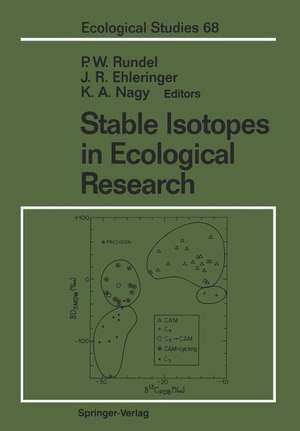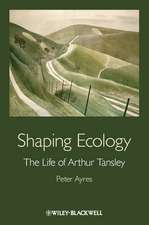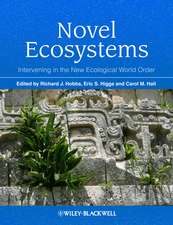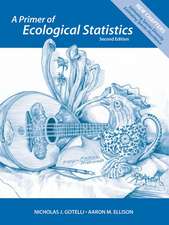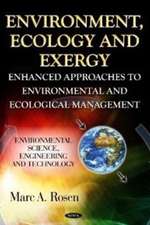Stable Isotopes in Ecological Research: Ecological Studies, cartea 68
Editat de P.W. Rundel, J. R. Ehleringer, K. A. Nagyen Limba Engleză Paperback – 17 sep 2011
Din seria Ecological Studies
- 18%
 Preț: 1118.93 lei
Preț: 1118.93 lei -
 Preț: 553.72 lei
Preț: 553.72 lei - 18%
 Preț: 1680.55 lei
Preț: 1680.55 lei - 18%
 Preț: 1003.38 lei
Preț: 1003.38 lei - 20%
 Preț: 1004.71 lei
Preț: 1004.71 lei -
 Preț: 480.62 lei
Preț: 480.62 lei - 5%
 Preț: 752.26 lei
Preț: 752.26 lei - 15%
 Preț: 643.99 lei
Preț: 643.99 lei - 15%
 Preț: 644.18 lei
Preț: 644.18 lei - 15%
 Preț: 652.49 lei
Preț: 652.49 lei - 18%
 Preț: 789.83 lei
Preț: 789.83 lei -
 Preț: 382.36 lei
Preț: 382.36 lei - 15%
 Preț: 643.48 lei
Preț: 643.48 lei - 15%
 Preț: 646.30 lei
Preț: 646.30 lei - 15%
 Preț: 634.32 lei
Preț: 634.32 lei -
 Preț: 384.86 lei
Preț: 384.86 lei - 18%
 Preț: 789.98 lei
Preț: 789.98 lei - 15%
 Preț: 645.14 lei
Preț: 645.14 lei - 15%
 Preț: 649.39 lei
Preț: 649.39 lei - 18%
 Preț: 1005.43 lei
Preț: 1005.43 lei - 18%
 Preț: 949.23 lei
Preț: 949.23 lei - 15%
 Preț: 649.54 lei
Preț: 649.54 lei - 15%
 Preț: 643.34 lei
Preț: 643.34 lei - 15%
 Preț: 649.71 lei
Preț: 649.71 lei - 15%
 Preț: 638.76 lei
Preț: 638.76 lei - 18%
 Preț: 957.62 lei
Preț: 957.62 lei - 18%
 Preț: 1235.25 lei
Preț: 1235.25 lei - 18%
 Preț: 962.18 lei
Preț: 962.18 lei - 18%
 Preț: 949.23 lei
Preț: 949.23 lei - 15%
 Preț: 660.68 lei
Preț: 660.68 lei -
 Preț: 397.76 lei
Preț: 397.76 lei - 15%
 Preț: 638.24 lei
Preț: 638.24 lei - 18%
 Preț: 942.31 lei
Preț: 942.31 lei - 18%
 Preț: 1232.57 lei
Preț: 1232.57 lei - 15%
 Preț: 651.34 lei
Preț: 651.34 lei - 18%
 Preț: 952.72 lei
Preț: 952.72 lei - 18%
 Preț: 1834.27 lei
Preț: 1834.27 lei - 18%
 Preț: 1229.10 lei
Preț: 1229.10 lei -
 Preț: 423.95 lei
Preț: 423.95 lei - 18%
 Preț: 948.92 lei
Preț: 948.92 lei
Preț: 543.34 lei
Preț vechi: 639.23 lei
-15% Nou
Puncte Express: 815
Preț estimativ în valută:
104.00€ • 113.01$ • 87.42£
104.00€ • 113.01$ • 87.42£
Carte tipărită la comandă
Livrare economică 21 aprilie-05 mai
Preluare comenzi: 021 569.72.76
Specificații
ISBN-13: 9781461281276
ISBN-10: 146128127X
Pagini: 544
Ilustrații: XV, 525 p.
Dimensiuni: 170 x 244 x 29 mm
Greutate: 0.86 kg
Ediția:Softcover reprint of the original 1st ed. 1989
Editura: Springer
Colecția Springer
Seria Ecological Studies
Locul publicării:New York, NY, United States
ISBN-10: 146128127X
Pagini: 544
Ilustrații: XV, 525 p.
Dimensiuni: 170 x 244 x 29 mm
Greutate: 0.86 kg
Ediția:Softcover reprint of the original 1st ed. 1989
Editura: Springer
Colecția Springer
Seria Ecological Studies
Locul publicării:New York, NY, United States
Public țintă
ResearchCuprins
1. Stable Isotopes: History, Units, and Instrumentation.- Section I Ecophysiological Studies in Plants.- 2. Carbon Isotope Fractionation and Plant Water-Use Efficiency.- 3. Carbon Isotope Ratios and Physiological Processes in Aridland Plants.- 4. Stable Carbon Isotope Ratio as an Index of Water-Use Efficiency in C3 Halophytes—Possible Relationship to Strategies for Osmotic Adjustment.- 5. Stable Carbon Isotopes in Vernal Pool Aquatics of Differing Photosynthetic Pathways.- 6. Studies of Mechanisms Affecting the Fractionation of Carbon Isotopes in Photosynthesis.- 7. Intertree Variability of ?I3C in Tree Rings.- 8. Hydrogen Isotope Fractionation in Plant Tissues.- 9. Oxygen and Hydrogen Isotope Ratios in Plant Cellulose: Mechanisms and Applications.- 10. Stable Hydrogen Isotope Ratios in Plants: A Review of Current Theory and Some Potential Applications.- Section II Animal Food Webs and Feeding Ecology.- 11. Stable Carbon Isotopes in Terrestrial Ecosystem Research.- 12. ?13C Measurements as Indicators of Carbon Flow in Marine and Freshwater Ecosystems.- 13. Natural Carbon Isotope Tracers in Arctic Aquatic Food Webs.- 14. Some Problems and Potentials of Strontium Isotope Analysis for Human and Animal Ecology.- 15. Natural Isotope Abundances in Bowhead Whale (Balaena mysticetus) Baleen: Markers of Aging and Habitat Usage.- 16. Doubly-Labeled Water Studies of Vertebrate Physiological Ecology.- 17. A ?13C and ?15N Tracer Study of Nutrition in Aquaculture: Penaeus vannamei in a Pond Growout System.- Section III Ecosystem Process Studies.- 18. Stable Isotope Ratios and the Dynamics of Caliche in Desert Soils.- 19. The Use of Stable Isotopes in Assessing the Effect of Agriculture on Arid and Semi-Arid Soils.- 20. Estimates of N2 Fixation in Ecosystems: The Need for andBasis of the 15N Natural Abundance Method.- 21. The Use of Variation in the Natural Abundance of 15N to Assess Symbiotic Nitrogen Fixation by Woody Plants.- 22. 13C/12C Ratios in Atmospheric Methane and Some of Its Sources.- 23. Temperature-Dependent Hydrogen Isotope Fractionation in Cyanobacterial Sheaths: Applications to Studies of Modern and Precambrian Stromatolites.- 24. Sulfur Isotope Studies of the Pedosphere and Biosphere.- 25. Sulfate Fertilization and Changes in Stable Sulfur Isotopic Compositions of Lake Sediments.- 26. The Use of Stable Sulfur and Nitrogen Isotopes in Studies of Plant Responses to Air Pollution.- 27. The Use of Stable Sulfur Isotope Ratios in Air Pollution Studies: An Ecosystem Approach in South Florida.- 28. 87Sr/86Sr Ratios Measure the Sources and Flow of Strontium in Terrestrial Ecosystems.
